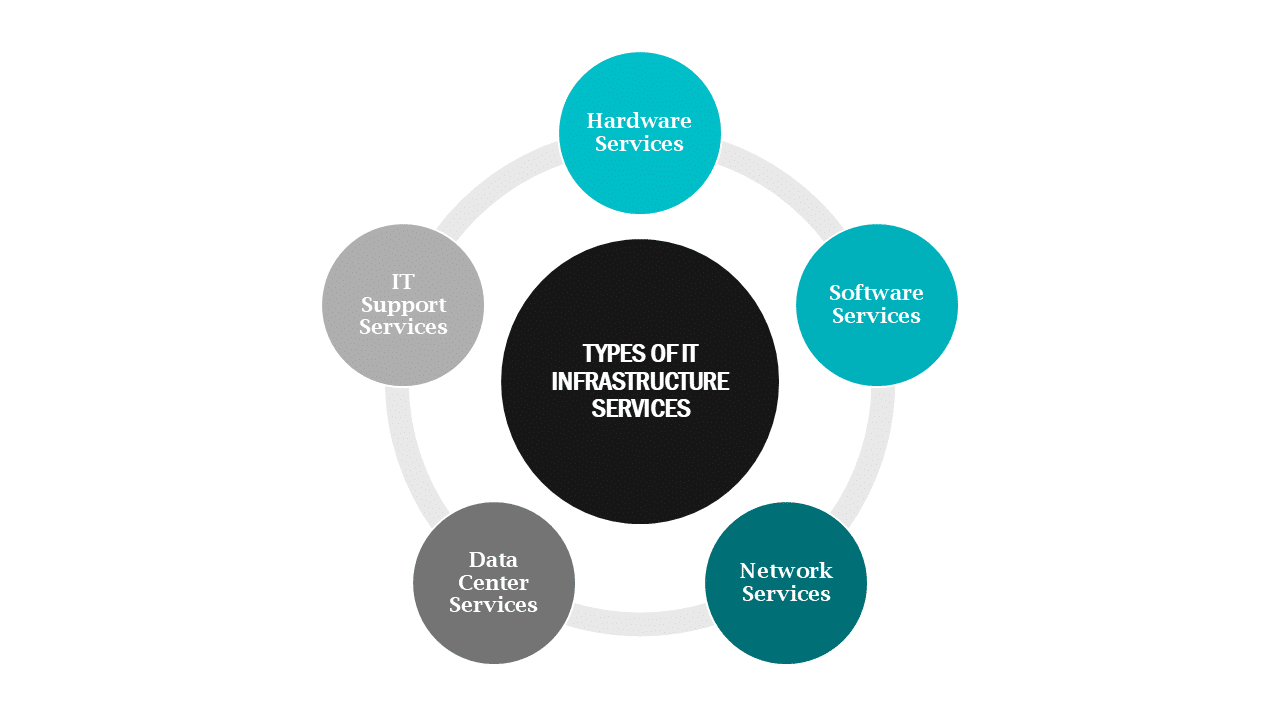IT infrastructure services are the backbone of any successful business operation. These services encompass a wide range of solutions that ensure your business’s technology framework is robust, efficient, and secure. From hardware and software to networks and data centers, IT infrastructure services play a crucial role in supporting your business’s daily functions and long-term goals.
- 1. What are IT Infrastructure Services?
- 2. Types of IT Infrastructure Services
- 3. Benefits of IT Infrastructure Services
- 4. Key Components of IT Infrastructure Services
- 5. IT Infrastructure Management
- 6. Best Practices for IT Infrastructure Management
- 7. How a Managed Service Provider Can Help
- 8. Conclusion
- 9. Need Help Getting Started?
- 10. Related Articles
What are IT Infrastructure Services?
IT infrastructure services refer to the comprehensive suite of services that manage and maintain the foundational technology components of an organization. These services include the provision, management, and support of hardware, software, network resources, and services required for the existence, operation, and management of an enterprise IT environment.
Importance of IT Infrastructure Services
Having a well-structured IT infrastructure is essential for several reasons:
- Efficiency and Productivity: Streamlines operations and enhances employee productivity.
- Scalability: Supports business growth and adapts to new challenges.
- Security: Protects data and mitigates risks of cyber threats.
- Cost Management: Optimizes resources and reduces unnecessary expenses.
By understanding the significance of IT infrastructure services, businesses can make informed decisions to enhance their operational efficiency, security, and scalability. As we delve deeper into this guide, we will explore the diverse types of IT infrastructure services, their benefits, key components, best practices, and how a Managed Service Provider (MSP) can be a valuable partner in managing these critical services.
Types of IT Infrastructure Services
Understanding the distinct types of IT infrastructure services is key to selecting the right solutions for your business needs. These services can be broadly categorized into hardware services, software services, network services, data center services, and IT support services.

Hardware Services
Servers: Servers are centralized resources that store, process, and manage data for various applications within a business. They are crucial for running enterprise applications, managing data, and ensuring that users can access necessary resources.
Storage Solutions: Efficient storage solutions are essential for managing the vast amounts of data generated by modern businesses. This includes traditional on-premises storage, network-attached storage (NAS), and storage area networks (SANs), as well as more modern cloud-based storage solutions.
Networking Equipment: Networking equipment such as routers, switches, and firewalls are fundamental for ensuring seamless communication and data transfer within an organization. These devices help in creating a robust network infrastructure that supports business operations and connectivity.
Software Services
Operating Systems: Operating systems (OS) are the foundational software that manage hardware resources and provide common services for application software. Common examples include Windows Server, Linux distributions, and macOS Server.
Enterprise Applications: These are business-specific software solutions that support various organizational functions. Examples include Customer Relationship Management (CRM) systems, Enterprise Resource Planning (ERP) systems, and Human Resource Management (HRM) systems. These applications help streamline processes and improve efficiency across departments.
Network Services
LAN/WAN Services: Local Area Network (LAN) and Wide Area Network (WAN) services are essential for ensuring that various parts of a business can communicate effectively. LANs connect computers within a limited area such as an office building, while WANs connect larger geographic areas, including different cities or countries.
Wireless Solutions: Wireless networks provide flexibility for employees to connect to the business network without the constraints of physical cables. This is increasingly important in today’s mobile and flexible work environments.
Security Solutions: Network security solutions, including firewalls, Virtual Private Networks (VPNs), and intrusion detection systems, are crucial for protecting an organization’s data and ensuring secure communications across the net
Data Center Services
Colocation Services: Colocation services involve renting physical space, power, cooling, and security in a data center for your servers and other hardware. This allows businesses to leverage advanced data center facilities without the capital investment required to build and maintain their own.
Cloud Services: Cloud services offer virtualized resources that provide scalability and flexibility. This includes Infrastructure as a Service (IaaS), Platform as a Service (PaaS), and Software as a Service (SaaS). Cloud solutions enable businesses to scale resources up or down based on demand and access services from anywhere with an internet connection.
IT Support Services
Help Desk Support: Help desk support services provide troubleshooting and resolution for IT issues faced by end-users. This can include remote support, on-site support, and 24/7 help desk services to ensure that users receive timely assistance.
Maintenance and Monitoring: Regular maintenance and monitoring are essential for ensuring that IT systems operate smoothly and efficiently. This includes applying updates, patching security vulnerabilities, and monitoring system performance to detect and resolve issues before they impact business operations.

Benefits of IT Infrastructure Services
Investing in IT infrastructure services provides numerous benefits to modern businesses. From enhancing performance to ensuring security and compliance, these services are essential for maintaining a competitive edge in today’s fast-paced business environment.
Enhanced Performance and Efficiency
By optimizing your IT infrastructure, you can significantly improve the performance and efficiency of your business operations. This leads to faster processing times, reduced downtime, and better overall productivity. Well-managed IT infrastructure services ensure that your systems and applications run smoothly, minimizing disruptions, and enabling employees to focus on their core tasks.
Improved Security and Compliance
IT infrastructure services include robust security measures to protect against cyber threats and ensure compliance with industry regulations. This minimizes the risk of data breaches and legal issues. With regular security assessments, vulnerability testing, and the implementation of advanced security solutions, your business can safeguard sensitive data and maintain trust with customers and partners.
Cost Savings
Effective IT infrastructure management can lead to substantial cost savings by reducing the need for expensive hardware, minimizing downtime, and optimizing resource allocation. By leveraging cloud services and virtualization, businesses can avoid the expensive costs associated with purchasing and maintaining physical hardware. Additionally, proactive maintenance and monitoring help prevent costly outages and repairs.
Scalability and Flexibility
Modern IT infrastructure services offer scalable solutions that can grow with your business. Whether you need to add new users, increase storage, or expand your network, these services provide the flexibility to adapt to changing needs. Cloud-based solutions allow businesses to scale resources up or down based on demand, ensuring that you only pay for what you use.
Business Continuity and Disaster Recovery
Having a robust IT infrastructure in place ensures business continuity and effective disaster recovery. In the event of a system failure, natural disaster, or cyber-attack, having a comprehensive disaster recovery plan and backup solutions in place can minimize downtime and data loss. This helps maintain business operations and reduces the impact of unforeseen events on your organization.
Competitive Advantage
By leveraging advanced IT infrastructure services, businesses can gain a competitive advantage in their industry. Enhanced performance, improved security, and the ability to quickly adapt to market changes enable companies to stay ahead of competitors. Additionally, modern IT solutions can support innovative business models and improve customer experiences, further strengthening your market position.
Streamlined IT Operations
IT infrastructure services help streamline IT operations by providing comprehensive management and support for all technology components. This reduces the complexity of managing multiple systems and allows IT staff to focus on strategic initiatives rather than day-to-day maintenance tasks. Streamlined operations lead to more efficient use of resources and better alignment with business goals.

Key Components of IT Infrastructure Services
A robust IT infrastructure comprises several critical components, each playing a pivotal role in ensuring the seamless operation of business processes. These components work together to support your organization’s IT needs, providing a stable, secure, and efficient environment.
Servers and Storage
Servers: Servers are the heart of any IT infrastructure. They host applications, manage data, and enable various business functions. Depending on your needs, servers can be on-premises, virtual, or cloud-based. Each type offers different benefits in terms of control, scalability, and cost-efficiency.
Storage Solutions: Storage solutions are essential for managing the vast amounts of data generated by businesses today. This includes primary storage for active data, backup solutions for data protection, and archival storage for long-term data retention. Technologies such as NAS, SAN, and cloud storage offer diverse options to meet different storage requirements.
Networking
Networking Equipment: Networking equipment, including routers, switches, and firewalls, ensures that data can move smoothly and securely within and outside your organization. A well-designed network infrastructure supports efficient communication, data transfer, and resource sharing across all departments.
LAN/WAN Services: Local Area Networks (LANs) connect devices within a specific area, such as an office, while Wide Area Networks (WANs) link geographically dispersed locations. These services are critical for enabling collaboration and data access across your business locations.
Wireless Solutions: Wireless networks provide the flexibility for employees to connect to the business network without being tethered by cables. This is increasingly important for supporting mobile devices and remote work scenarios.
Data Centers and Cloud Solutions
Data Centers: Data centers are facilities that house critical IT infrastructure components, including servers, storage, and networking equipment. They provide the necessary power, cooling, and security to ensure that these components operate reliably. Businesses can use their own data centers or leverage colocation services to reduce capital expenditures.
Cloud Solutions: Cloud services offer virtualized resources over the internet, providing flexibility, scalability, and cost savings. Options include:
- Infrastructure as a Service (IaaS): Provides virtualized computing resources over the internet.
- Platform as a Service (PaaS): Offers hardware and software tools over the internet, typically for application development.
- Software as a Service (SaaS): Delivers software applications over the internet, on a subscription basis.
Security Solutions
Firewalls: Firewalls act as the first line of defense, controlling incoming and outgoing network traffic based on predetermined security rules. They help prevent unauthorized access to your network.
Intrusion Detection and Prevention Systems (IDPS): These systems monitor network traffic for suspicious activity and prevent potential threats.
Encryption: Encryption ensures that data is protected by converting it into a secure format that can only be read by authorized users. This is essential for protecting sensitive information both in transit and at rest.
VPNs: Virtual Private Networks (VPNs) provide secure connections over the internet, allowing remote employees to access the company network safely.
IT Support Services
Help Desk Support: Help desk support services help users with IT issues. This includes troubleshooting problems, answering questions, and providing solutions to ensure minimal disruption to business operations.
Maintenance and Monitoring: Regular maintenance and proactive monitoring are essential for keeping IT systems running smoothly. This includes applying software updates, patching vulnerabilities, and monitoring system performance to identify and resolve issues before they impact business operations.

IT Infrastructure Management
Effective IT infrastructure management ensures that all components of your IT infrastructure work together seamlessly. This involves overseeing hardware, software, networks, and data centers to optimize performance, enhance security, and support the business’s strategic objectives.
Proper management includes regular maintenance, monitoring, and updates to prevent issues and ensure optimal performance.
Importance of Effective Management
Operational Efficiency: Well-managed IT infrastructure ensures that all systems run smoothly, minimizing downtime and interruptions. This leads to higher productivity and better resource utilization.
Cost Control: By proactively managing IT assets, businesses can avoid unexpected costs associated with system failures, emergency repairs, and inefficient resource usage. Regular maintenance and monitoring help identify and address potential issues before they become costly problems.
Security and Compliance: Effective management includes implementing robust security measures and ensuring compliance with industry regulations. This protects the organization from cyber threats and legal repercussions.
Scalability: A well-managed infrastructure can easily adapt to changing business needs. Whether expanding operations, integrating innovative technologies, or responding to market changes, scalable infrastructure management ensures that the IT environment can grow with the business.
Best Practices for IT Infrastructure Management
Regular Assessments
Proactive Monitoring
Disaster Recovery Planning
Scalability Planning
Change Management
Security Management
Vendor Management
Tools and Technologies for IT Infrastructure Management
Leveraging the right tools and technologies can enhance the effectiveness of IT infrastructure management. Here are some essential tools:
Network Monitoring Tools: Tools like Nagios, SolarWinds, and PRTG Network Monitor provide real-time insights into network performance and help in identifying issues promptly.
Configuration Management Tools: Tools such as Ansible, Puppet, and Chef automate the management of system configurations, ensuring consistency and compliance.
Backup and Recovery Solutions: Solutions like Veeam, Acronis, and Carbonite provide comprehensive backup and recovery capabilities, ensuring data protection and quick recovery in case of disasters.
Security Information and Event Management (SIEM) Tools: SIEM tools like Splunk, IBM QRadar, and ArcSight collect and analyze security data, helping in detecting and responding to security incidents.
Cloud Management Platforms: Platforms such as AWS Management Console, Microsoft Azure Portal, and Google Cloud Console offer tools for managing cloud resources effectively.

How a Managed Service Provider Can Help
Partnering with a Managed Service Provider can significantly enhance your IT infrastructure management. MSPs offer a range of services designed to optimize performance, improve security, and reduce costs, allowing businesses to focus on their core operations. Here is how an MSP can be a valuable partner in managing your IT infrastructure.
Expert Support
Access to Specialized Expertise: MSPs provide access to a team of IT experts with specialized skills and knowledge. This ensures that your IT infrastructure is managed by professionals who are current with the latest technologies and best practices.
24/7 Support: Many MSPs offer round-the-clock support, ensuring that any issues are promptly addressed, minimizing downtime, and maintaining business continuity. This is particularly valuable for businesses with global operations or those that require constant availability.
Proactive Consultation: MSPs often provide strategic consultation services, helping businesses align their IT infrastructure with their long-term goals. This includes advising on technology investments, capacity planning, and scalability.
Proactive Maintenance and Monitoring
Continuous Monitoring: MSPs use advanced monitoring tools to continuously track the performance of your IT infrastructure. This proactive approach allows them to detect and resolve issues before they escalate, ensuring optimal performance and reliability.
Regular Maintenance: MSPs handle routine maintenance tasks such as software updates, patches, and hardware inspections. This ensures that your systems are always up-to-date and secure, reducing the risk of vulnerabilities and failures.
Automated Alerts: By leveraging automated monitoring solutions, MSPs can set up alerts for potential issues such as network bottlenecks, server overloads, or security breaches. This enables swift intervention to mitigate risks and maintain system integrity.
Cost-Effective Solutions
Reduced Operational Costs: By outsourcing IT infrastructure management to an MSP, businesses can reduce the costs associated with hiring and training in-house IT staff. MSPs offer flexible pricing models, allowing you to pay for only the services you need.
Predictable Budgeting: MSPs typically provide their services on a subscription basis, which makes budgeting for IT expenses more predictable. This helps businesses manage their finances better and avoid unexpected costs.
Optimized Resource Utilization: MSPs can help businesses optimize their IT resources, ensuring that they are used efficiently. This includes right-sizing cloud resources, optimizing storage, and managing network capacity to reduce wastage and lower costs.
Enhanced Security
Advanced Security Measures: MSPs implement robust security measures to protect your IT infrastructure from cyber threats. This includes firewalls, intrusion detection systems, encryption, and regular security assessments to identify and mitigate vulnerabilities.
Compliance Management: MSPs ensure that your IT infrastructure complies with industry regulations and standards. This is crucial for businesses operating in regulated industries such as healthcare, finance, and retail, where compliance is critical.
Incident Response and Recovery: In the event of a security incident, MSPs provide rapid response and recovery services to minimize damage and restore normal operations. This includes data recovery, system restoration, and forensic analysis to understand the root cause of the incident.
Scalability and Flexibility
Scalable Solutions: MSPs offer scalable solutions that can grow with your business. Whether you need to add users, increase storage capacity, or expand your network, MSPs can quickly adjust resources to meet your changing needs.
Flexible Service Models: MSPs provide flexible service models, allowing businesses to choose the level of support they need. This can range from fully managed services to co-managed solutions where the MSP works alongside your internal IT team.
Cloud Integration: MSPs can help businesses leverage cloud services for greater flexibility and scalability. This includes migrating workloads to the cloud, managing hybrid environments, and optimizing cloud resources to ensure cost-efficiency and performance.
Focus on Core Business Functions
Operational Efficiency: By outsourcing IT infrastructure management to an MSP, businesses can focus on their core functions and strategic initiatives. This allows internal teams to concentrate on driving innovation and achieving business goals without being bogged down by IT maintenance tasks.
Strategic IT Alignment: MSPs work closely with businesses to align IT infrastructure with strategic objectives. This ensures that technology investments support business goals and provide a competitive edge in the market.
Conclusion
Investing in IT infrastructure services is essential for modern businesses looking to improve efficiency, enhance security, and support growth. By understanding the diverse types of IT infrastructure services and the benefits they provide, you can make informed decisions about the best solutions for your business.
thirtyone3 technology, Your Arizona-Based MSP Provider
Investing in IT infrastructure services is essential for modern businesses looking to improve efficiency, enhance security, and support growth. By understanding the diverse types of IT infrastructure services and the benefits they provide, you can make informed decisions about the best solutions for your business.
That said, managing IT infrastructure can be a daunting task. The complexity of integrating hardware, software, network solutions, and data centers while maintaining optimal performance and security can be overwhelming. This is where many businesses face challenges that can lead to inefficiencies, security vulnerabilities, and increased costs.
But there is no need to navigate these challenges alone. With thirtyone3 technology, you have a trusted partner with the expertise and experience to guide you. We specialize in providing tailored IT infrastructure services that meet the unique needs of modern businesses. Our team of experts is dedicated to helping you build a robust, secure, and efficient IT environment that supports your strategic goals.
Contact us today to learn more about how our IT infrastructure services can help your business thrive. Let us work together to create an IT strategy that drives success and innovation.

